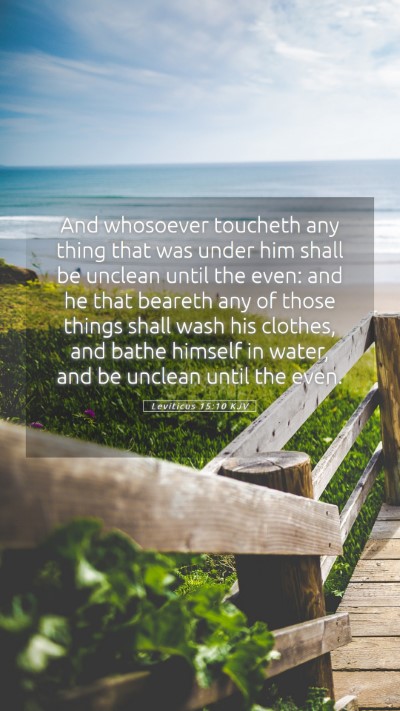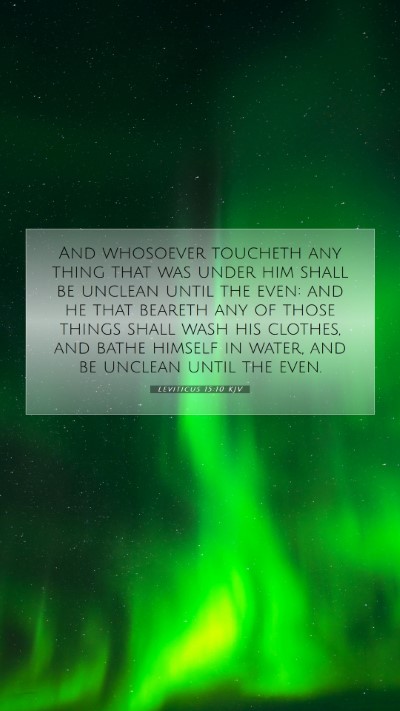Understanding Leviticus 15:10
Leviticus 15:10 states:
"And whosoever toucheth any thing that was under him shall be unclean until the even; and he that beareth any of those things shall wash his clothes, and bathe himself in water, and be unclean until the even."
This verse addresses the laws regarding ritual purity, emphasizing the importance of cleanliness in the life of the Israelites.
Verse Context and Background
The Book of Leviticus contains laws and regulations given to the Israelites, primarily concerning their worship and daily living in accordance with God’s covenant. Leviticus 15 specifically deals with ceremonial uncleanness, particularly related to bodily discharges and the implications for community health and worship.
Analysis of Leviticus 15:10
- Ritual Purity: This verse reflects the broader theme of purity laws that govern the Israelite community. Touching anything associated with an unclean person results in the transfer of unclean status, necessitating cleansing rituals.
- Community Implications: Matthew Henry notes that the laws were designed to ensure the holiness of the community and the sanctuary. By maintaining cleanliness, they preserved their standing before God.
- Symbolism of Cleanliness: In the commentaries of Albert Barnes and Adam Clarke, the physical act of cleaning one’s body and clothes symbolizes spiritual readiness to approach God. Sin and impurity have to be dealt with before one can participate in sacred activities.
Significance of the Verse
This scripture emphasizes:
- Physical and Spiritual Connection: The act of washing represents a deeper condition of the heart and soul. Jurisprudential practices highlighted the separation of the clean and unclean as a visible reminder to the Israelites to stay pure in their covenant commitment.
- Preparation for Worship: Adam Clarke emphasizes the necessity of being spiritually prepared for worship and fellowship with God, as the Israelites could not enter the presence of God in an unclean state.
Bible Verse Interpretation
The interpretation of Leviticus 15:10 leads to various principles applicable to modern-day readers:
- Understanding Scripture: Understanding this verse helps to highlight the seriousness of sin and the necessity of maintenance of purity. Just as the Israelites needed to ensure their physical cleanliness, believers are called to examine their lives for sins that need addressing.
- Bible Study Insights: In Bible study groups, this verse can foster discussions around the importance of community integrity, personal accountability, and the overarching theme of redemption found in both the Old and New Testaments.
Cross References
Leviticus 15:10 can be linked to additional scriptures that discuss similar themes:
- Numbers 19:11-13 - Discusses the impact of contact with the dead on ritual purity.
- Leviticus 11:44 - Covers God’s call for Israel to be holy and clean as He is holy.
- Hebrews 12:14 - Addresses the call for holiness and the pursuit of peace with all men.
Applying Bible Verses to Daily Life
For those seeking to apply Leviticus 15:10 in their lives:
- Reflection on Personal Conduct: Ask yourself if there are areas in your life that require cleansing, both physically and spiritually.
- Community Engagement: Engage with others in your faith community, fostering an environment that emphasizes purity and readiness to worship.
- Understanding Difficult Bible Passages: Seek guidance through Bible study resources and tools to delve deeper into the regulations of Leviticus while considering their significance in a contemporary context.
Conclusion
Leviticus 15:10 serves as a powerful reminder of the importance of cleanliness, both physical and spiritual, in the journey of faith. As believers reflect on the historical context and implications of this verse, they can draw lessons about the seriousness of sin, the necessity of cleansing, and the call to be a holy people. By engaging with scripture through in-depth analysis, individuals can enrich their understanding and application of God's word in their lives.


